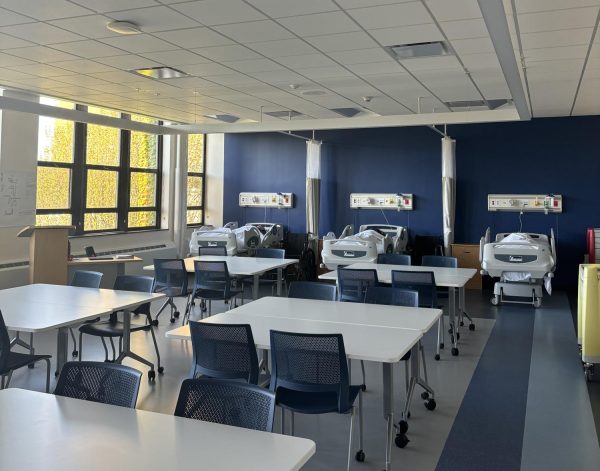Students placed on ‘Do Not Disturb’ with new phone policy
September 23, 2022
At the beginning of this school year, the ETHS administration introduced a new cell phone policy for students.
The policy, which was introduced via email on the first day of school, specifies, “Cell phones are not to be used in academic spaces (classrooms/labs) without permission from the teacher or school staff… Cell phones and electronic devices, earbuds, and/or earphones must not be visible, must be turned off or muted during the entire class period, and before entering offices, libraries, instructional spaces, or academic areas.”
Teachers held mixed feelings about the new policy.
One concern teachers voiced centered around how students’ current relationship with phones may not correlate well with being in higher learning institutions or workplaces.
“I want you all to be able to learn to navigate phones plus life, because in a year or more, you’re going to be in college or out in the world and need to do that on your own,” said Forensics teacher Adam Held.
Besides anxieties about interference with plans for the future, teachers are also nervous about how phones are affecting students now.
“My number one concern is around students’ mental health. Students have told me stories about being bullied online and how text messages in class foster further conflicts outside of class. It makes me worried that there is something that not just distracts the student from opportunities for them to learn and get the most out of class, but that there is such a larger social distraction that isn’t safe sometimes,” said English and Reading teacher Patricia Delacruz.
Since the release of the policy, teachers have adapted it into their classes in different ways. Some, like Delacruz, allow students to use their phones if in an emergency. Others, like Held, chose to use a new program. PocketPoints, an app that tracks how much time a student has their phone off during class, gives students points towards gift cards for different restaurants based off of that amount of off-screen time.
“There’s two ways to motivate someone. It’s through positive rewards or negative consequences. For this class environment and building relationships with kids, which I think Evanston makes their number one priority, a positive reward system is better for building those relationships and encouraging kids to do things in a better way,” said Held.
As teachers figure out ways to implement the policy in a way that fits their classroom spaces, student reactions have mostly been negative. Many don’t believe the policy will make any positive change.
“I think kids will just continue to try and sneak phone usage, and I don’t think [banning phones from classrooms]that’s the best way around that,” said sophomore Jexa Edinberg. In contrast to Held’s concerns, Edinberg also pointed out that colleges and workplaces will not have specific cell phone policies and will rely on individual people to regulate themselves.
Additionally, students pointed out that phones can actually help some students academically.
“I find the part where I can’t listen to music in class to be really hard for me, because that is a way that I stay grounded to focus on my work,” said senior Elliot Jamison.
Some of the issues caused by phones last year may have been residual damage from the year that everyone spent online.
“Last year, I agree that there was an excess of phone usage, because we just came out of COVID, and we were so used to being on technology. Half of the kids were on their phone while on Zoom, so it makes sense that kids were on their phones more,” said senior Amira Grace.
While some students can see the purpose behind the policy, the implementation was confusing.
“I am not going to sit here and say that there wasn’t an email sent out with all the policies, because I know that was sent out in the beginning of the school year. However, I think the administration knows that a lot of students don’t check their email often,” said Grace.
The manner in which the policy was communicated led to panic among many students, including Edinberg, who at first was afraid that they could be penalized for using their headphones during passing periods.
According to Assistant Superintendent and Principal Taya Kinzie, the policy was a reaction to last year’s more lenient post-COVID regulations.
“I think we tried to provide a lot of support and grace and give a lot of latitude [with the amount of phone usage]. That worked well in many ways, and in some ways, it didn’t… So that’s why we’ve all been having many conversations even last year about how to hold ourselves in loving accountability.”
Combined with the new tardy policies and lunch policies, loving accountability is an overarching theme this year for the administration. However, students are primarily focused on how the policy will affect their lives.




















Vivien Bissell • Oct 3, 2022 at 9:02 am
What does “loving accountability even mean?”